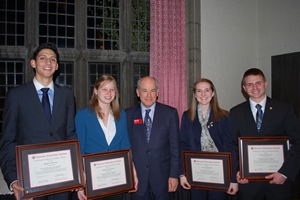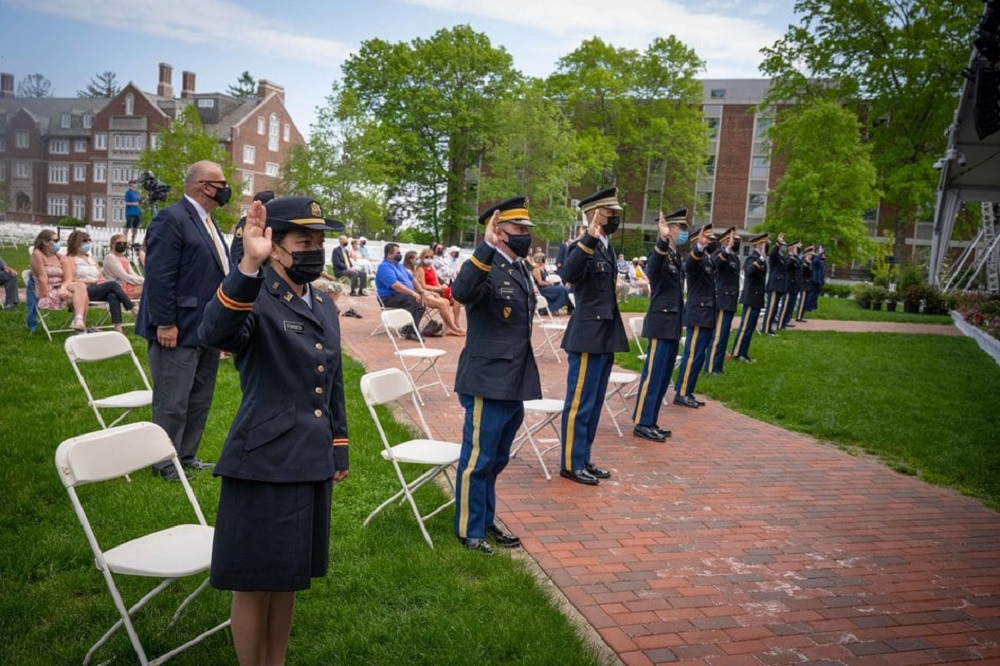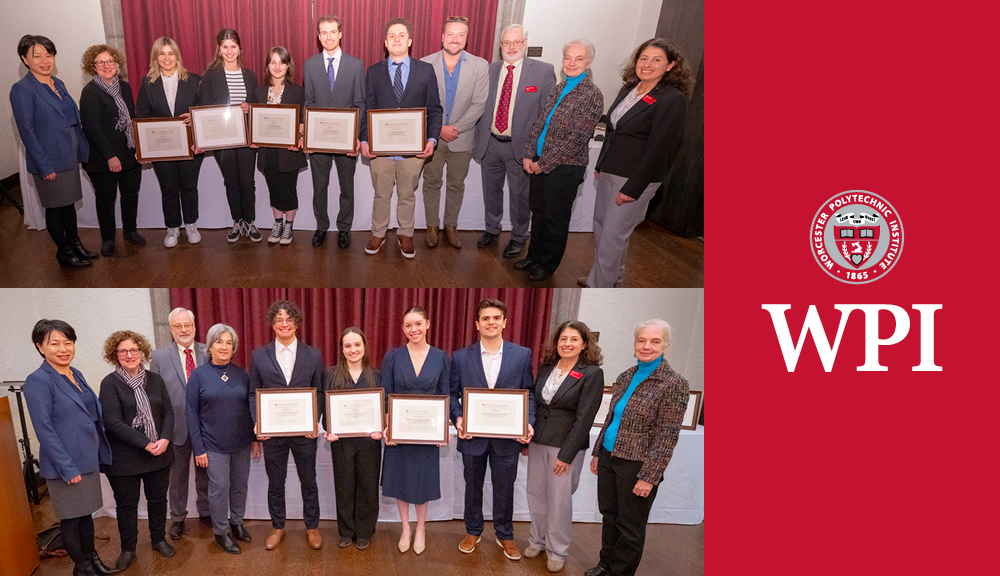
From left, Marco Villar, Emily Domingue, President
Dennis Berkey, Emily Fournier, and Jonathan Cline.
A team of Worcester Polytechnic Institute (WPI) undergraduate students that researched and implemented solutions for improving insulation in shack dwellings in rural Namibia won the prestigious WPI President’s IQP Award on Friday, Jan. 25.
Last year, as part of their required IQP (Interactive Qualifying Project), WPI seniors Jonathan Cline of Lisbon, Conn., Emily Fournier of Sturbridge, Mass., Marco Villar of Chula Vista, Calif., and Emily Domingue of Somerset, Mass., traveled to the Southwest African country of Namibia, which has a desert climate. The metal shacks in the informal settlements of Katutura are unbearably hot in the summer and cold in winter. The goal of this project was to develop sustainable paper insulation to improve thermal regulation in these shacks.
In Namibia, some 25 percent of the population lives in informal settlements. One of the largest of these informal settlements is Katutura, located on the outskirts of Windhoek. Residents of this informal settlement live in self-constructed shacks, called kambashus, made of corrugated zinc sheets nailed to a wooden frame. Since most residents do not have access to commodities such as electricity, it is difficult to deal with the extreme Namibian climate.
The students worked with the Men on the Side of the Road Project (MSR), a non-profit organization, to help develop the Paper Insulation Project, the aim of which as to use recycled paper and woodchip materials to produce a cheap, fire-resistant, and sustainable insulation for local kambashus. The production and marketing of this insulation would also provide community members with a source of employment and income.
"The IQP is one of the most distinctive hallmarks of the WPI education because it brings theory and practice together in ways that are both tangible and meaningful to our students, and to communities around the globe," said WPI President Dennis Berkey. "These projects engage students in important work, allowing for them to connect and apply their skills and formal learning to real needs, whether in one of our 30 global project centers or right here at home. These students are truly among WPI’s best ambassadors, and their message is that WPI – and this nation – is home to people who are thoughtful and giving and caring and innovative. They do impressive work and demonstrate remarkable character, and I am very proud of their accomplishments."
The IQP is one of two projects required of WPI undergraduates; it allows students to pursue hands-on, real-world research opportunities all over the world. Working in teams under the guidance of faculty advisors, students conduct their research either locally or at one of more than 30 WPI-sponsored project centers to address—and solve—real problems that lie at the interface of science, technology, social issues, and human needs. (WPI has sent more undergraduate engineering and science students abroad for academic research than any other university in the United States.) Through participation at project centers, WPI students address local issues, develop an understanding of other cultures, and see how their lives and work will play out on a global stage. To be considered for the President’s IQP Award, projects must be superior in conception, execution, and presentation. You can see more details about this year’s winning project here.
The other finalists included:
- "Supporting Urban Beekeeping Livelihood Strategies in Cape Town," by Adam Cadwallader of Auburn, N.Y., Victoria Hewey of Sanford, Maine, Evren Simsek of Istanbul, Turkey, and Santiago Isaza of Hudson, N.H.
- "Heat Impacts on Occupational Health: A Comparison Between Agricultural and Industrial Settings in the Time of Climate Change," by Sarah Bober of Woodstock, Conn., Devin Harrison of Sound Beach, N.Y., Rachel Hickcox of Watertown, Conn. and Chelsea Miller of Ann Arbor, Mich.
- "Designing a Water Quality Monitoring Plan for El Yunque National Forest," by Kassondra Hickey of Gloversville, N.Y., Xavier Miller of Boylston, Mass., Richard Valdes of Oakdale, Conn., and Frank Bruton of Springfield, Mass.
- "Lights on the Horizon: A Socioeconomic Impact Evaluation of Rural Electrification in Tsumkwe, Namibia," by Donal Boyd of Raynham, Mass., Brennan Ashton of Bellingham, Wash., Lauren Bisacky of Chester, Conn., and Jessica Lopez of Palmer, Mass.


